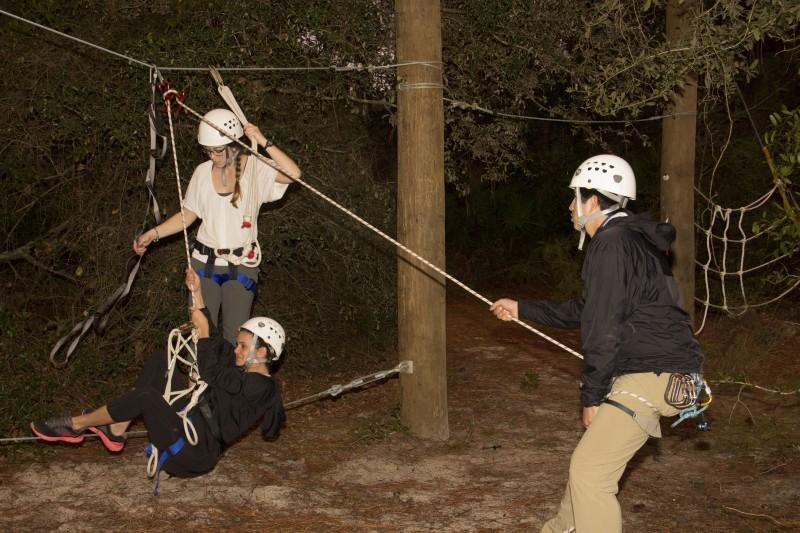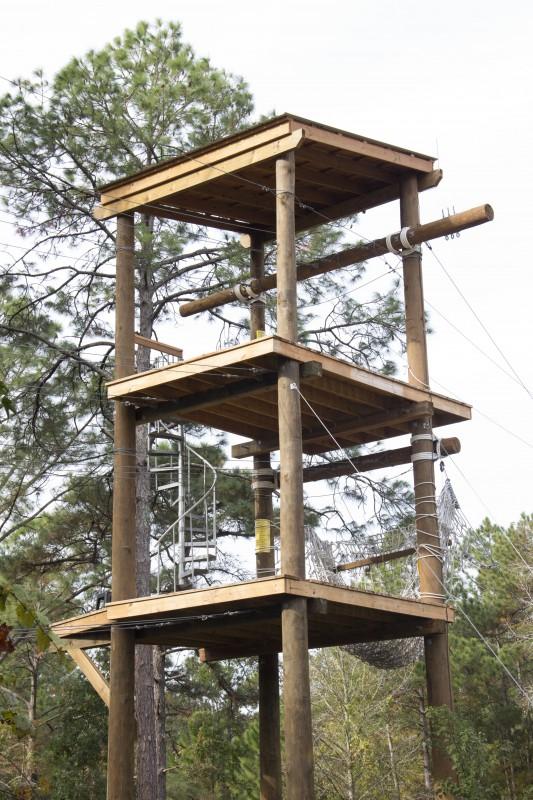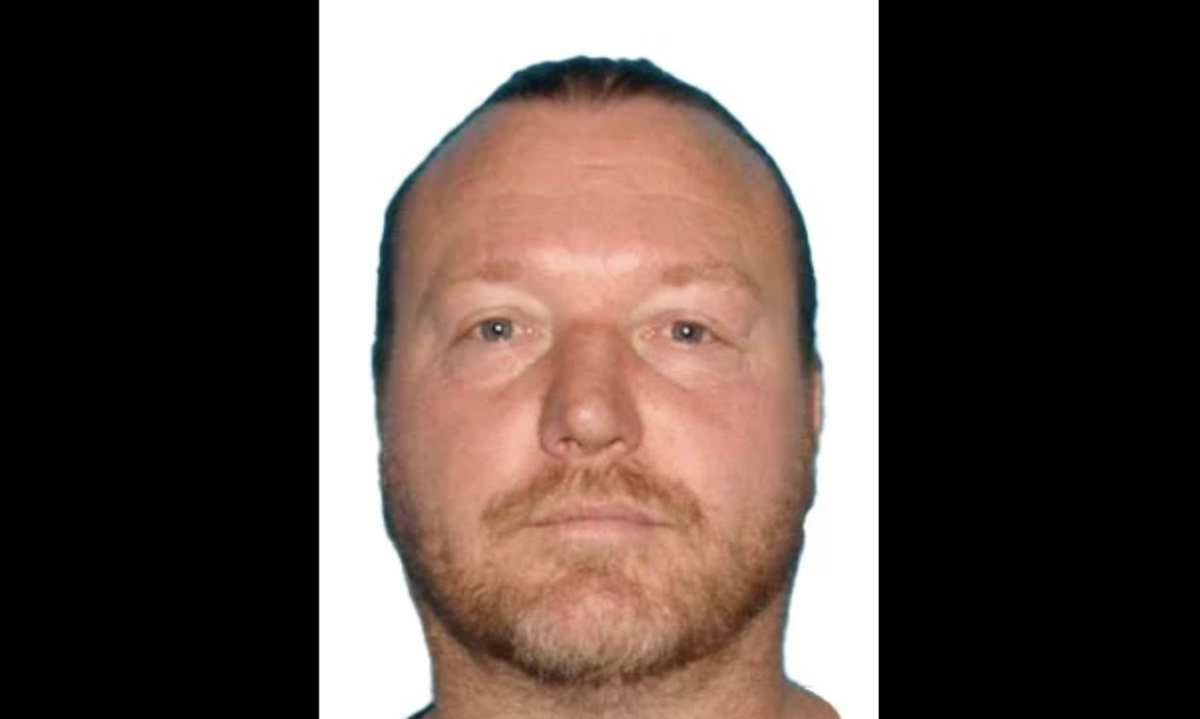
From left: UNF students Blair Hakimian and Sarah Vansandt rope in the group morale-building course on campus. Tomas Marentes, the manager of the Osprey Challenge Course, assisted them.
Students are noticing the UNF Osprey Challenge Course, on any given day, looks more like an abandoned tree fort than a rigorous high-altitude event.
Although it sits idle throughout most of the day, OCC facilitators are assuring students the $250,000 student-funded course is seeing plenty of action — so much that they are no longer taking reservations until further notice.
“We’re booked throughout the semester,” said Tomas Marentes, OCC manager.
Marentes said, since opening in September, the course has held events every weekend for a campus club or organization, including Student Government, Kappa Delta sorority and, most recently, the 2013 Doctors of Physical Therapy from the Brooks College of Health.
He said there are two or three programs participating per month, not including staff training programs.
Marentes said one of the biggest reasons people might feel it’s not being used is because of its newness and that it’s only open to UNF students.
Sergio Bayona-Diaz, an international student from Colombia and course facilitator, said almost all of the 17 trained faculty members are students.
Marentes said class schedules limit any organization or group to the days student-facilitators are available to help operate the course.

Bayona-Diaz said another reason the course doesn’t appear busy is that training is still ongoing and there are many course hours that must be met to go from trainee to facilitator.
Marentes said it is also hard to find committed groups capable of exhausting four to eight hours for the courses’ physically demanding programs.
“That’s a big chunk of time to be in the air,” Marentes said.
Bayona-Diaz said, with training nearing completion, the course will be able to open to public groups and organizations as early as January.
Ben Waddington, a UNF public law junior, said he has seen the course in use only once during the week since it was built.
Marentes said weekdays were slow but not void of events. He said the facilitator schedules offered much more flexibility during the weekends.
He said the most recent weekday group was the 2013 Doctors of Physical Therapy from the Brooks College of Health. The group’s first day on the course was Oct. 25. It returned Nov. 7 to complete its high-element challenges.
Reservation reservations
Marentes said reservations are all online and must be made 21 days prior to participation. UNF Campus Recreation gives three optional days for those who sign up, to better coordinate what works for the staff and the group.
Alex Mross, a UNF journalism junior, said he would love to use the course were it not for the three-week waiting period after signing up.
“You can’t just go on a free Friday,” Waddington said, “you have to wait three whole weeks.”
Marentes said the three-week waiting period is crucial because it allows facilitators and visitors to interact and personalize their experience.
To do that, Bayona-Diaz said, groups regularly meet with staff to discuss group interests, what skills need to be developed and what goals are expected to be met from the challenge.
“We want to make sure what the group wants to develop,” he said.
The University of South Florida’s course, the Riverfront Park Challenge Course, is similar to the Osprey Challenge Course in that it has low- and high-altitude events and is designed to be more of a team-building exercise than an obstacle course.
D.J. Pollock, outdoor recreation coordinator for USF, said USF’s course sees a lot of action.
“The big struggle is making sure there are enough facilitators to keep participation high,” Pollock said.
He said a lot of nearby middle and high schools use the facility, as well, and said Reserve Officers’ Training Corps groups of up to 100 people are common.
The challenges
Justin Cato, assistant director for intramural and club sports, helped train some of the challenge course’s student-facilitators.
He said one of the first, and possibly most demanding, challenges is the Y-knot.
Two ropes on either side of the treehouse combine into one knotted rope and extend the length of the challenge. Students must work their way over the knot together, remaining in contact with the person in front of or behind them.
“Some groups can handle it,” Cato said. “Some can’t.”
Island Hoppers is a high-level element that involves groups migrating, in unison, across six suspended 2-feet-by-3-feet platforms. Cato said all members of the group must be present on one platform before moving to the next platform.
He said Island Hoppers is not only physically challenging but is also a great exercise in communication and teamwork.
The Scary Ferry requires students to pull their body weight through the course. Groups of four sit on a suspended log and use hanging ropes as pulleys. By pulling the rope, the log glides along its course from the starting tree house to the checkpoint gate.
When participants don’t pull at the same time, the log can twist, making it harder to navigate the log.
When performed successfully, Cato said the challenge can be completed in a couple minutes. The 2013 Doctors of Physical Therapy spent well over half an hour attempting to complete the challenge Nov. 7.
Sasha Griffith, an outdoor pursuits intern for Florida Gulf Coast University, said her campus’ Eagle Challenge Course remains fairly busy and will have 22 groups throughout the Fall semester. The course sits out on a 10-acre field, miles away from the main campus.
Pollock and Griffith said summer and the beginning of fall have been the busiest times for the course.
Both Pollock and Griffith said the weekends are busier than weekdays because students staff the course and must attend class all week.
“Hopefully over time, it will get more popular,” Mross said.
Pollock said USF Student Government does not fund The Eagle Challenge Course, and students must pay to use its facilities — $15 for the full, six-hour program.
At UNF, Student Government-sponsored organizations can use the facilities for free, but independent students and student groups must pay fees. Those fees range from $12.75 to $51.63, according to the pricing matrix on the Osprey Challenge Course’s website. Each price is per student and is dependent on which course the group would like to fulfill.
The Osprey Challenge Course requires groups of eight for any of the event programs.
Email Justin Chandler Porter at reporter2@unfspinnaker.com.











